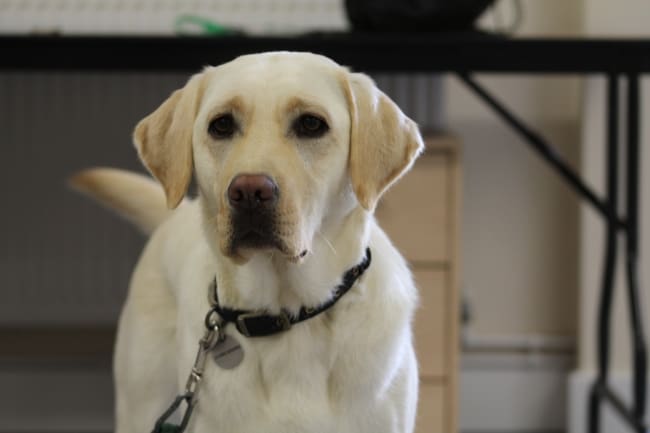Our Chief Executive Peter Gorbing explores the ways Dogs for Good is trying to create better health and wellbeing outcomes for people, and how we need to build a society that embraces animals and recognises the critical role they play in many people’s lives.
At Dogs for Good we know that dogs bring health, social and economic benefits to all of us.
The health benefits of dogs to people are fairly well documented and researched – better physical health through exercise, lower risks of cardiovascular disease, increased immunity to allergies and fewer visits to the doctors. Dogs also support people’s mental health and well-being in so many ways, not least because they are great social icebreakers, making dog owners feel connected to the communities where they live.
Dogs for Good has a specific role through all of its services to support people with a range of disabilities and conditions enabling children and adults to interact with assistance dogs, pet dogs or therapy dogs. In all of our work, we see the huge difference that dogs make to people’s health and well-being.

Why do we not always consider this in wider society and why do policy makers so often fail to understand the positive contribution dogs play in people’s lives?
From my experience, policy makers often recognise the value their pet dogs bring to their own lives, but do not translate this understanding into the wider public health and well-being agenda.
The trend of policy making in recent years has often been more focused on reducing access for dogs, for example by stopping them from enjoying access to public spaces in towns and cities and preventing older people from keeping their dogs when they go into sheltered housing or residential settings. Many of these policies have been born out of responses to specific incidents that often lead to causing unintended consequences for the dog owning community, the dogs themselves and then society as a whole.
A study recently carried out by the University of Lincoln and Dogs for Good found that dogs are saving the NHS an estimated £2.45bn a year – primarily the result of fewer visits to the doctor and improved mental well-being. Think how much more we could all save if we were really creative about how dogs could support some of the government’s national well being strategies and priorities.
Here are just a few ways Dogs for Good is trying to create better health and well being outcomes for people in more cost-effective ways:
- Supporting people with a range of physical and learning disabilities to live in the community is critical yet expensive. We anticipate the pilot project we are doing with a local authority to support people with learning disabilities and autism will reduce care costs significantly and deliver better quality of life outcomes for these people.
- Social isolation, particularly amongst older people, is a major problem in all communities and we know that dogs could play a huge role in helping people keep engaged in their communities – building on their love for dogs. Over the next year we will be developing a series of projects across the UK to test out creative ideas around breaking social isolation for vulnerable people.
- The government’s national dementia strategy identified the importance of early interventions and good quality care to support people with dementia and their carers. Our Dementia Dog project, collaborating with Alzheimer Scotland, has already shown the difference that an assistance dog can make to a person with dementia and their carer helping to reduce anxieties, improve family relationships and help people get out more. We are excited to have been given further grants to continue this work for at least three years. There is a huge opportunity to make a big difference here.
- We have a lot to bring to the national autism strategy. We know that dogs can make a significant difference to many adults and children on the autism spectrum. There is an opportunity for policy makers to work with Dogs for Good to harness our learning and explore how we could support many more people with autism to lead the lives they want, including getting and sustaining jobs and volunteer opportunities.
The exciting thing is that all these opportunities could bring about better outcomes for people whilst delivering savings to the public purse, a real win-win.

Receive our e-newsletter
Sign up for monthly updates about our life changing work, training tips, and stories of our amazing partnerships between people and dogs
So, how can we make a difference?
It just requires us to think creatively, do more research and evaluation to demonstrate the benefits that dogs can bring to people and ensure we always work in a responsible way. We need to build a society that embraces animals and recognises the critical role they play in many people’s lives.
To support this vision, we need to:
- Recognise that we live in a multi-species society and embrace it in [all]our decision-making.
- Create communities where dogs are welcome and people and their dogs can thrive recognising that they are an integral part of family life for many people. This should include considering ways to relax Public Space Protection Orders, enabling dogs to stay with older people when they move into care homes and thinking about how we can accommodate dogs well within our physical environment.
- Create more active and participative dog education programmes that ensure people take proper responsibility for their dogs. Everyone who has a dog will benefit from building a strong bond with their dog. The work Dogs for Good has done helping parents in our Family Dog service to understand and build a bond with their dog is a great starting place.
- Work with other agencies to develop community dog programmes across the UK to bring people together around their love of dogs, support the more vulnerable people in our communities and explore innovative opportunities like social prescriptions. By doing this we believe we can make a difference to the significant social and welfare issues we face in society.
Let’s just keep talking about the fact that dogs do make a difference and are good for us!